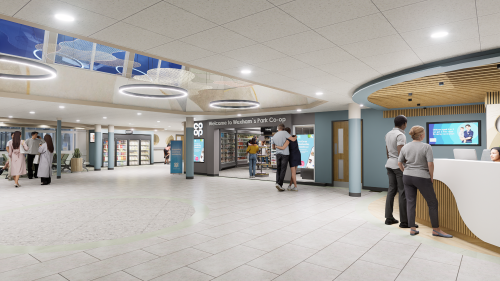
New look for hospital entrances
Date published: 14 June 2024
It’s Men’s Health Week (June 10-16), aiming to raise awareness about health challenges faced by men and promote strategies for better physical and mental well-being.

“That’s a good thing, as prostate issues need a discussion,” said Neil Barber (pictured), clinical lead for Urology at Frimley Health. “For men, it’s part of getting older and it’s important they know it’s ok, and that you can do something about this.”
Neil joined Frimley Park Hospital as consultant urological surgeon in 2005. A strong supporter of research, his involvement in a number of studies has been instrumental in seeing new prostate treatments being made available within the Trust and across the NHS as a standard of care.
“As men get older, it is inevitable that the prostate will grow and in a significant proportion of men – around 60% of 60-year-olds, for instance – they will start to experience some kind of symptoms related to it.”
This condition is known as benign prostatic hyperplasia, or BPH. As it grows, the prostate presses on the urethra, the tube along which urine flows out of the body, leading to a poor urinary stream.
“That doesn’t tend to cause bother to men,” said Neil. “It’s as the process proceeds and they start to see issues relating to it, such as an increased frequency to pee, perhaps with a sense of urgency, rushing to the loo and not being able to hold on. Perhaps it’s getting up at night a number of times to pass urine.
“These symptoms can really affect a man’s quality of life. Older gentlemen expect to be more active and outgoing these days. Lifestyles have changed, with 70-year-old men doing more now than my granddad ever did. So BPH can have a huge impact. I’ve seen patients who have to plan their lives around the nearest toilet, or whose sleep is ruined and are suffering because of it.”
While you can’t stop your prostate getting bigger, you can minimise the impact it has on your quality of life. Options range from lifestyle decisions, tablets which can improve symptoms, and surgical choices – including minimally invasive procedures with a reduced chance of side-effects and quicker recovery times.
“There has been an evolution in treatments, and Frimley Health has been part of all these advances. We are the experts. We do great stuff here – people should be aware and proud of our work with prostate trials,” he said.
“With all the options we have, we’re rather unique compared to almost any other trust in the country. Whether it’s lasers, interventional radiological treatment, the standard TURP, Aquablation or minimally invasive options such as UroLift, Rezum and iTIND – Frimley Health can help tailor your treatment and choice to your needs and circumstances.
“The important message is don’t be shy about asking your GP for tests, or talking about waterworks symptoms that affect your quality of life. There’s more choice than ever before to manage this condition.”
Lifestyle tips for a healthy prostate: